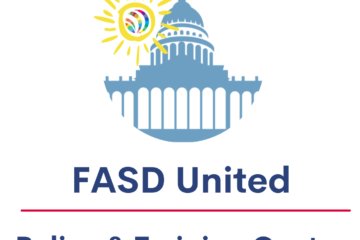We are thrilled to announce another piece of FASD informed legislation has been introduced, this time by the Legislature of Washington State. House Bill 1168, introduced by representatives Tarra Simmons, Alex Ramel, Lisa Callan, Sharon Wylie, Lauren Davis, and Timm Ormsby, primarily seeks to provide prevention services, diagnoses, treatment, and support for prenatal substance exposure. The bill does this by amending and adding sections to existing laws pertaining to prenatal substance exposure.
The authors of the bill begin by acknowledging the following:
- FASDs are lifelong physical, developmental, behavioral, and intellectual disabilities.
- As many as 1 in 20 in the US are affected by FASDs.
- Prenatal exposure to substances other than alcohol may affect the child.
- Washington State’s diagnostic capabilities are limited.
- Lack of supports and treatment increases the likelihood of individuals to experience adverse outcomes.
- Investment in prevention and early intervention will improve schooling for individuals with FASDs.
- Effective awareness of these issues requires coordination across the private and public sectors.
By acknowledging these realities, the Washington State Legislature is affirming what the FASD world already knows: adequate supports, treatments, and diagnostic capabilities can lead to positive change for individuals with FASDs, and that this reality has been ignored for too long. By focusing on both preventive and early intervention strategies this bill aligns with FASD United’s core principles of Respect, Progress, Integrity, Unity, and Equity.
By January 2024, the State would be mandated to contract with a group to provide services to children and families within the child welfare system. The provider would have expertise in prenatal substance exposure treatment and family supports and would have the goal of serving the greatest number of families possible. This contract would allow more families to stay together while minimizing placements, leading to the least restrictive and disruptive experience for children and families. The program would expand by January 2025, with three additional providers being mandated with offering treatment services and family supports to those affected by prenatal substance exposure.
Admirably, the bill asserts that support and treatment services offered must be trauma informed. The supports offered include:
- Occupational, speech, and language therapy.
- Behavioral health counseling and caregiver counseling.
- Sensory processing support.
- Educational advocacy, psychoeducation, and social skill support.
- Links to community resources.
- Family supports and education.
A Washington State based, trauma informed, non-profit organization with expertise in prenatal substance exposure treatment would also be utilized. They would be charged with the task of creating education and training programs for providers, as well as acting as coaches and supporters of families affected by FASDs. Another non-profit organization would be charged with providing free support groups to individuals with FASDs and their families or caregivers.
This legislation would also explore barriers to diagnoses, treatment, and services and ways to increase access for individuals with FASDs. In doing so, there would be at least six stakeholder meetings attended by service provides, medical professionals, families affected by FASDs, communities affected by FASDs, and self-advocates. This group would consider the availability of evaluation, diagnosis, and treatment services for children, youth, and adults, while ensuring availability for rural and urban areas alike. The group would recommend changes that would decrease barriers to treatment, like the definition of medical necessity, prior authorization requirements for diagnosis, and limitations of treatment procedure codes and insurance coverage.
An amendment within the bill would include the Department of Children, Youth, and Families as part of an interagency group responsible for ensuring coordination of identification, prevention, and intervention programs for children affected by prenatal substance exposure, as well as individuals at high risk of having children with prenatal alcohol exposure. This interagency group would act in a way that would allow advocacy groups to participate in the development of identification, prevention, and treatment programs. This would also mandate the State to work directly with impacted individuals, advocacy group, affected families, and FASD experts. Recommendations on all the topics previously mentioned would be presented to the Legislature by July 2024, with a final strategic plan being introduced by July 2025. Most recently, we have seen legislation introduce in North Dakota that would create a FASD council like the group in this bill.
Passage of this bill would be monumental as it acknowledges the realities of individuals with FASDs and seeks to provide prevention and treatment supports. It does this by centering the lived experiences of individuals with FASDs and marrying it with FASD informed health and human services providers. Notably, the bill would create an interagency group that would interact with all the relevant stakeholders, allowing the most people to be positively impacted and ensuring inclusion of the most at risk communities and populations.
Leading the advocacy effort locally is Wonderland Child and Family Services, the parent organization of Hope RISING Clinic, which serves children with prenatal substance exposure and their families. Collaborating with Wonderland Child and Family Services is FASD Focus NW (formerly NOFAS WA). FASD Focus NW, a longtime FASD United Affiliate, offers monthly support groups, partners with school districts throughout the state to help them become more FASD aware, and hosts an information and training clearinghouse on their website.


1 Comment
State Advocacy – Washington State – FASD United Policy And Training Center · March 5, 2023 at 12:38 pm
[…] TO READ A SUMMARY OF THE BILL FROM FASD UNITED CLICK HERE […]
Comments are closed.